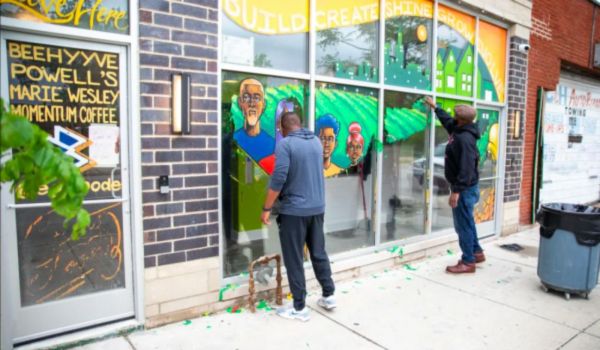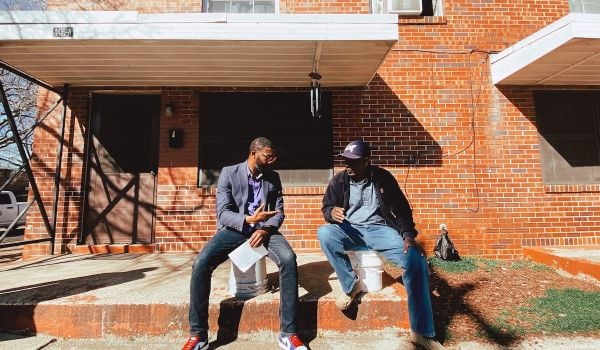As Genesee County treasurer, Dan Kildee founded the nation’s first community land bank in Flint, Mich., a city with 102,000 people, 13,000 vacant lots and 4,000 empty houses. Kildee has since moved on — to U.S. Congress, where he advocates for post-industrial “legacy” cities like Flint, calling for federal assistance with everything from public safety to economic development. In Forefront this week, Edward McClelland sets out to see what’s next for Kildee and his shrinking city back home.
Flint, Mich. in mid-summer is one of the lushest cities in America. It’s not just the variety of verdure growing in the damp Great Lakes climate — oaks and elms in the sky, yarrow, chicory and goldenrod on the ground — but all the spaces that greenery has to fill. Grass grows along lightning patterns in cracked sidewalks. Weeds rise to full tide in empty lots.
Dan Kildee, Flint’s freshman congressman, hasn’t visited his grandmother’s old house in nearly a year, since he first campaigned for his job. Then, the roof had been staved in by a fallen cottonwood. Now, the house has disappeared, another casualty of the arsonists who entertain themselves by thrill-burning vacant dwellings. On arson calls, Flint’s understaffed fire department only tries to prevent flames from spreading to the neighbors. If they douse them, the firebugs will return to finish the job. All up and down Jane Avenue, empty spaces outnumber slumping Craftsman houses.
Kildee mounts a charred porch step and aims his smartphone camera at the foundation, now a trash dump whose most prominent discard is a rubber tire. A feral white cat stalks among the blackened timbers.
“This looks rural,” the burly, balding congressman mutters, before indulging in every Flintoid’s favorite emotion: nostalgia. “I remember as a kid this being a vibrant neighborhood, and an interesting neighborhood. It was anchored by St. Mary’s Church.”
When Kildee began his own political career, as a “long-haired” 18-year-old Flint Board of Education member in 1977, the block was still “intact,” with a house on every lot and a GM car in every driveway. Still, he didn’t quite break the record for youngest elected official in the nation. That title belonged to Michael Moore, who a few years earlier had been elected to the school board in Flint suburb of Davison, also as a shaggy 18-year-old. The two moved in the same progressive circles, and Kildee contributed to Moore’s alternative newspaper, the Flint Voice.
But by the time the two men cut their hair and began making names for themselves, the Flint they’d grown up in was gone. Assembly line automation, Japanese competition and General Motors’ impatience with labor militancy — this is the city where United Auto Workers was founded during a violent strike — have reduced automaking jobs from 80,000 to 6,000 today. Buick City, an industrial complex built to rival Japanese production methods, closed in 1999 and was razed to a concrete slab last year. Chevy in the Hole, a fabled plant where the famous General Motors Sit-Down Strike took place, went down in 2004.
Kildee has been an elected official for all but 2.5 years of his voting life. His political career is a coeval of his hometown’s decline, devoted to managing the emptying out of Flint and other Rust Belt cities, so blight and crime don’t destroy the quality of life for residents too poor or stubborn to escape. As treasurer of Genesee County, he founded the nation’s first community land bank. Designed to take vacant buildings out of the hands of real estate speculators and put them under the control of local government, the Genesee County Land Bank has been copied by dozens of communities with more land than people to live on it.
It was that policy success that helped pave his path to Washington, where Kildee has become a champion not only for his hometown and home state, but for all the nation’s “legacy” cities, as he calls Midwestern and Northeastern metropolises struggling to adapt to a post-industrial century.
“It’s invaluable to have somebody inside the Beltway who understands what’s happening on the ground,” said Jim Rokakis, a former treasurer for Cuyahoga County, Ohio, who adopted Kildee’s land bank concept to deal with the foreclosure crisis that hit Cleveland earlier, and harder, than the rest of the nation. “Somebody who has served at the local level as county treasurer. We both very, very closely watched this foreclosure crisis. Dan got it, and that’s why he responded with this idea that’s going to be his legacy. He’s the father of the land bank movement.”
As a congressman, Kildee pestered Federal Reserve Chair Ben Bernanke on how the Fed could help cities facing bankruptcy — months before Detroit found itself in that very situation. He brought home millions of dollars to tear down abandoned houses in Michigan. And he was the first congressman to address the Detroit bankruptcy on the House floor, citing it as “a call to action to have a much bigger discussion about how we support and fund our cities.”
“Dan really cares about these older industrial cities,” said Alan Mallach, a Brookings Institution fellow who began working with Kildee in Flint and continues to do so in Washington. “There aren’t too many members of Congress who do. He’s an extremely articulate voice for older cities.”
In late July, Detroit’s bankruptcy was the finance story of the week. “The consequences for the failure of a whole set of great American cities is not limited to the people who live in those places,” Kildee, the city’s most outspoken defender in Washington, told Bloomberg News at the time. He got the attention because he’s taken on a cause few other congressmen associated themselves with.
But how that translates to D.C.’s halls of power is still unknown. Back in Michigan, Kildee was one of the most innovative public officials in the nation. Can he now convince Washington that America’s struggling cities are worth saving?
To read more, subscribe to Forefront. Already a subscriber? Click here to continue reading.













